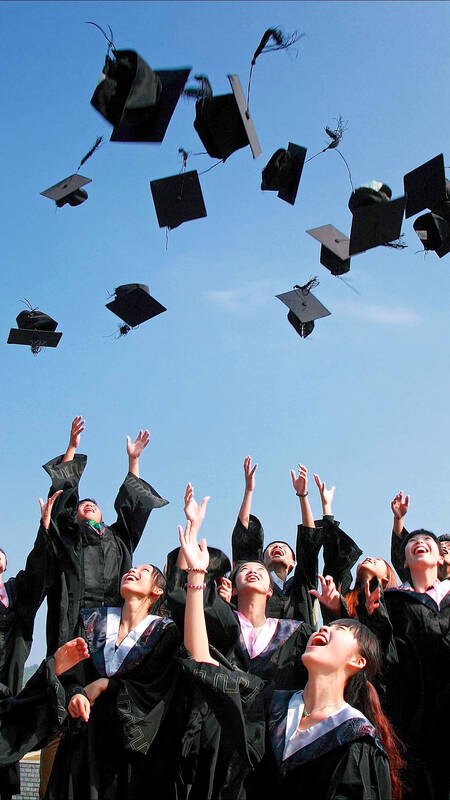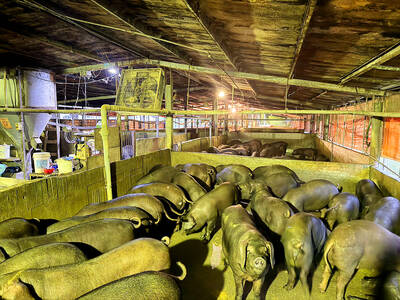對話 Dialogue
清清:這樣好看!就這樣吧!
Qīngqing: Zhèyàng hǎokàn! Jiù zhèyàng ba!

Photo courtesy of Piqsels 照片:Piqsels提供
華華:看你弄了好久了,你在忙什麼?
Huáhua: Kàn nǐ nòngle hǎojiǔle, nǐ zài máng shénme?
清清:我堂哥跟表妹畢業了,而且成績都很好,只是堂哥是研究所,表妹是大學。剛好他們念的都是我的母校,家族好多人都去參加他們的畢業典禮,我在把那天的照片做成影片,要分享給大家。
Qīngqing: Wǒ tánggē gēn biǎomèi bìyèle, érqiě chéngjī dōu hěn hǎo, zhǐshì tánggē shì yánjiùsuǒ, biǎomèi shì dàxué. Gānghǎo tāmen niàn de dōu shì wǒ de mǔxiào, jiāzú hǎoduō rén dōu qù cānjiā tāmen de bìyè diǎnlǐ, wǒ zài bǎ nàtiān de zhàopiàn zuòchéng yǐngpiàn, yào fēnxiǎng gěi dàjiā.
華華:哇!你們是校友咧!恭喜他們!不過,畢業以後,他們有什麼打算呢?
Huáhua: Wa! Nǐmen shì xiàoyǒu lie! Gōngxǐ tāmen! Búguò, bìyè yǐhòu, tāmen yǒu shénme dǎsuàn ne?
清清:我堂哥找到了在新竹科學園區的工作,我叔叔很高興。表妹申請到了美國的學校,要出國留學,我姑姑雖然很捨不得,但也支持她出去闖一闖。
Qīngqing: Wǒ tánggē zhǎodàole zài Xīnzhú Kēxué Yuánqū de gōngzuò, wǒ shúshu hěn gāoxìng. Biǎomèi shēnqǐng dàole Měiguó de xuéxiào, yào chūguó liúxué, wǒ gūgu suīrán hěn shěbùdé, dàn yě zhīchí tā chūqù chuǎng yì chuǎng.
華華:聽起來很不錯,不像有些人,畢業就是失業,不知道該高興還是難過。
Huáhua: Tīng qǐlái hěn búcuò, búxiàng yǒuxiē rén, bìyè jiùshì shīyè, bù zhīdào gāi gāoxìng háishì nánguò.
清清:如果一時真的找不到合適的工作,就先去學點一技之長吧!反正年輕有的是機會。
Qīngqing: Rúguǒ yìshí zhēnde zhǎobúdào héshì de gōngzuò, jiù xiān qù xué diǎn yíjìzhīcháng ba, fǎnzhèng niánqīng yǒudeshì jīhuì.
華華:對啊!現在的人不都喜歡斜槓嗎?多會一項技能,就多一條發展的路,有能力、不怕吃苦,總會找到好工作的。
Huáhua: Duì a! Xiànzài de rén bù dōu xǐhuān xiégàng ma? Duō huì yí xiàng jìnéng, jiù duō yì tiáo fāzhǎn de lù, yǒu nénglì, búpà chīkǔ, zǒng huì zhǎodào hǎo gōngzuò de.
翻譯 Translation
Qingqing: That looks nice! Let’s go with that!
Huahua: You’ve been at it for quite a while. What are you busy with?
Qingqing: My cousins graduated, and they both did very well. One of my cousins is in graduate school, and the other is in university. They both happen to be graduates of my alma mater. Many family members went to their graduation ceremonies, so I’m making a video with the photos from that day to share with everyone.
Huahua: Wow! You’re all alumni! Congratulations to them! But what are their plans after graduation?
Qingqing: My cousin found a job in the Hsinchu Science Park, and my uncle is very happy. The other cousin applied to a university in the United States for further studies, planning to study abroad. Although my aunt is reluctant to let her go, she is also supportive of her going out and exploring.
Huahua: Sounds great, unlike some people who end up unemployed after graduation, not knowing whether to be happy or sad.
Qingqing: If they can’t find a suitable job right away, they can always learn a new skill. After all, being young means having plenty of opportunities.
Huahua: Exactly! Nowadays, people like to have multiple skills, right? The more skills you have, the more paths you have for development. With skills and perseverance, they are sure to find a good job.
生詞 Vocabulary
1. 畢業 (bìyè) graduate
2. 堂哥 (tánggē) cousin: the son of one’s father’s brother (older than oneself)
3. 表妹 (biǎomèi) cousin: a female who is younger than oneself, from the paternal aunt’s or maternal family’s side)
4. 母校 (mǔxiào) alma mater
5. 校友 (xiàoyǒu) alumni
6. 留學 (liúxué) study abroad
7. 一技之長 (yíjìzhīcháng) [phrase] a specialized skill, a particular skill
8. 斜槓 (xiégàng) multiple skills
教材音檔 Audio Files
國立清華大學華語中心提供
By National Tsing Hua University Chinese Language Center:

For many people in Taiwan, childhood memories of rural life include pig pens standing beside family homes. Leftover rice, vegetable scraps and soup from daily meals were poured into buckets and fed to pigs. This practice of feeding pigs with household food waste was once a common way of life, both an economic choice and an expression of agricultural society’s deep respect for conserving resources. From a practical standpoint, pigs are omnivorous animals capable of efficiently digesting food scraps that humans can no longer eat. For rural households, food waste cost almost nothing, yet it could be converted into pork, a

Sea star wasting disease (SSWD) is a strange and serious illness affecting sea stars, or starfish. This disease causes sea stars to develop painful lesions, lose their arms, and eventually turn into a gooey, melted mess. Since it was first observed in 2013, millions of sea stars along the Pacific coast of North America have died from this __1__. Although viruses were once considered a possible cause, researchers now believe that environmental stressors and microorganisms are primarily __2__ for sea star wasting disease. One of the main environmental triggers appears to be warmer ocean water. When the water heats

Tango unfolds in a dimly lit room, where a haunting melody ushers two dancers into a close embrace. Here, music and movement merge into a silent yet passionate conversation, expressing longing, memory and shared purpose. What makes tango truly magical is the deep interaction and spontaneous improvisation between partners. Tango began in the late 19th century in Buenos Aires, Argentina’s bustling capital. Born in the poor working-class neighborhoods and busy port areas, this dance emerged from a melting pot of cultures. European immigrants, African slaves and local residents all contributed to its unique character. From these rich influences, tango

Continued from yesterday(延續自昨日) https://www.taipeitimes.com/News/lang The loss of sea stars significantly impacts the ocean ecosystem. Sea stars are important __6__ that help control populations of mussels and sea urchins. Among them, the sunflower star is one of the largest and fastest sea stars and is adept at preying on sea urchins. Without sea stars, sea urchins can __7__ in numbers and devastate kelp forests. These forests are essential __8__ for many marine animals and also help capture carbon from the atmosphere, which is vital in the fight against climate change. The mystery behind SSWD is still __9__, but it is clear that